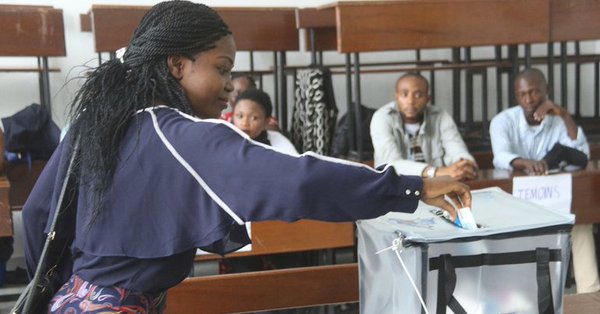
New York, Jan 5 (IBNS): The post-election environment in the Democratic Republic of the Congo (DRC) is “calm but tense” as the country waits for the results of the presidential poll, the UN Human Rights office (OHCHR) said on Friday.
Amid reports that journalists and opposition political candidates have been intimidated and access to selected media broadcasters remains blocked, OHCHR spokesperson Ravina Shamdasani warned that efforts to silence dissent could “backfire”.
Her comments come ahead of consultations behind closed doors on the election, in the UN Security Council in New York, later on Friday.
The result of the delayed poll held on 30 December – which featured 21 candidates - is due to be announced on Sunday, although the DRC’s electoral commission announced that this may be pushed back.
“What my colleagues have told me and they have observed is that the situation remains calm but tense ahead of the announcement of the results,” Ms Shamdasani said. “There are preliminary reports of some pockets of violence and people being injured.”
OHCHR has an office in the vast central African country but has not played a role in supervising the national election, which was held following a week’s delay and postponements dating back to 2016. Voting across several cities in eastern DRC that have been hit by the on-going Ebola outbreak and inter-communal violence, was postponed until March by the election commission (CENI).
Last Sunday’s vote will decide the successor to President Joseph Kabila, who came to office in 2001 after the previous incumbent, his father Laurent, was assassinated in the aftermath of a civil war involving numerous armed militias. Ms Shamdasani also noted reports that freedom of expression is under threat in DRC.
“Intimidation and harassment against journalists, opposition candidates and human rights defenders continues to take place,” she said. “This being a very sensitive, a very tense period, we are concerned that these efforts to silence dissent could backfire considerably when the results are announced. We are watching carefully, and we are calling on all sides to refrain from the use of violence.”
As the DRC waits for the results of the poll, Ms Shamdasani also highlighted evidence of other civil rights violations:
“The internet is cut off, the signal of Radio France Internationale (RFI) has been tampered with, as well as Canal Congo Television, which apparently belongs to the leader of the MLC, Jean-Pierre Bemba”, she said, referring to his party, the Movement for the Liberation of Congo.
Ahead of the presidential election, the UN’s top human rights official, Michelle Bachelet, condemned reports that police had reportedly fired live ammunition at opposition rallies.
The High Commissioner also spoke out against the use of inflammatory speech by political leaders and said that it was essential that people’s rights to freedom of expression and peaceful assembly were fully protected.
Renewed clashes force 16,000 into Congo-Brazzaville
In a major humanitarian developement on Friday, some 16,000 people from DRC have arrived in neighbouring Republic of the Congo – also known as Congo-Brazzaville - after fleeing deadly intercommunal clashes.
Andrej Mahecic from the UN Refugee Agency, UNHCR, said in Geneva that old hostilities flared up again at the end of last month between two communities in Yumbi, Mai-Ndombe Province, in western DRC.
People are “in dire need of basic assistance”, Mr Mahecic said, adding that those fleeing DRC spoke of attacks that “left homes burned and people killed”.
“This influx in a matter of days is a major event for Congo-Brazzaville,” he added. “The area is very remote, it’s not easy to reach, so we are right now, together with other agencies, including the World Food Programme (WFP), deploying teams to these areas and they are distributing the relief items including food and shelter materials and other items and this has been going on since 29 December.”
According to UNHCR, this is the largest influx of refugees in over a decade, since 130,000 people were forced to seek shelter amid ethnic clashes in DRC’s former Equator Province in 2009.
Refugees, mostly women and children of the Banunu tribe, continue to arrive in Makotipoko and Bouemba districts in the Republic of Congo, where they are given assistance.
Support Our Journalism
We cannot do without you.. your contribution supports unbiased journalism
IBNS is not driven by any ism- not wokeism, not racism, not skewed secularism, not hyper right-wing or left liberal ideals, nor by any hardline religious beliefs or hyper nationalism. We want to serve you good old objective news, as they are. We do not judge or preach. We let people decide for themselves. We only try to present factual and well-sourced news.







